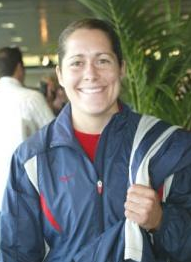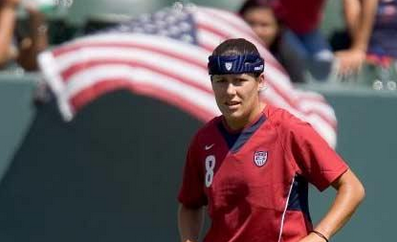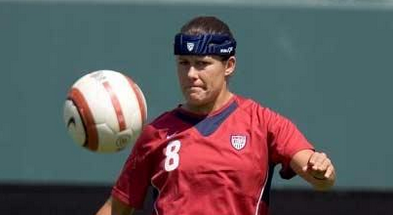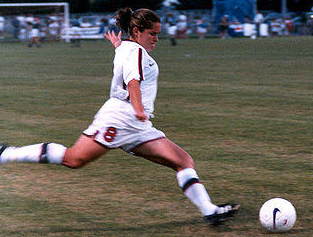Shannon MacMillan To Lead The DMCV Sharks Competitive Soccer Club As The New DOC
SoccerToday caught up with Gold Medalist and Hall of Fame Soccer Star Shannon MacMillan was recently promoted to Director of the Boys and Girls Competitive Soccer Program at the Del Mar Camel Valley Sharks Soccer Club. She is one of the few women in the world who oversees both the boys and girls competitive programs. MacMillan also works with U.S. Soccer and will continue to help identify talented soccer players for the U.S. Soccer Development Academy.

Diane Scavuzzo: Congratulations on taking over the Competitive Soccer Program at the Sharks.
Shannon MacMillan: Thanks, it is great to speak with you again.
Diane Scavuzzo: You are such an accomplished soccer player, being the first woman soccer player to be honored in the Hall of Fame, and having won Gold Medals. What is your greatest accomplishment in your life?
Shannon MacMillan: Gold medals and winning World Championships are amazing, but being a mom is the best accomplishment in my life.
Diane Scavuzzo: What has happened at the Sharks youth soccer club?
Shannon MacMillan: I was approached by the Sharks management board to run their entire competitive program. This is a break from the norm of the good ole boys club, asking a woman to run a boys soccer program. It is a great challenge. I am very excited. I have been fortunate to be blessed with a great career in soccer and now this excellent opportunity to develop our youth players. The Sharks is a large club with 40 competitive teams and 2,100 soccer players in the recreational program.
The Sharks are not a brand new club; they have been developing soccer players since the 1970s. Our goal is all about meeting the needs of the players and parents. I look forward to meeting this goal.
Diane Scavuzzo: What is your philosophy as Director of Coaching (DOC)?

Shannon MacMillan: My philosophy centers on honesty and respect. Being the Director of Coaching of a youth soccer program is about being honest and running the program with the utmost respect for the players and the parents.
Diane Scavuzzo: Were you surprised when the Sharks offered you the position of DOC of the club?
| Rene Miramontes, the previous U.S. Soccer Technical Advisor said “I am absolutely thrilled to have Shannon MacMillan involved in the scouting and development of the southern California players. She brings with her (literally) a world of experience that will only benefit the process and improve our youth national teams. Mac Millan is also one of those few ex-professionals that truly wants to give back to the soccer community and is willing to get into the ‘trenches’ and to be an integral part of the game.” |
Shannon MacMillan: No, when they initially brought me in, I was pregnant and I didn’t think it would be fair to take over the whole program, not being familiar with the youth side, so it wasn’t the first time the position was discussed. I am more immersed now in youth soccer and my son is older, already 19 month old. It is all about timing; it is a better time for me to take on this responsibility.”
Diane Scavuzzo: What did you think when the board approached you now to be the DOC of the club?
Shannon MacMillan: “When they first approached me, I was hesitant to see how the boys’ teams and parents would feel about a woman stepping in & taking over. Before anything was announced, I had the chance to coach some boys teams at the Presidio Cup Soccer Tournament and it was very successful.”
Diane Scavuzzo: How has it worked out?
Shannon MacMillan:“I have been received very well by the boys’ teams and the parents. I believe my job is to take care of the customers. The parents pay a lot of money to have their kids play soccer. We have to provide an environment that they can believe in. This is happening on the girls side and the Sharks’ board acknowledged what I have been doing.”
Diane Scavuzzo: Is there a difference coaching boys?
Shannon MacMillan: “Yes, there is a difference. The game is a lot faster, the play is more individualistic, the boys tend to have more flair when they get the ball and the girls are more oriented towards the team, but at the end of the day it is soccer.”
“And the boys have more raw energy. For example, during warm up, it is all about stretching. The boys do not need any chatting time. The girls need time to connect, chat and then they are ready to focus.
Diane Scavuzzo: How does this change coaching a team?
Shannon MacMillan: The general, technical aspects of the game are the same, but the personalities of the teams are different. The tactical development is about the game of soccer, but coaching the team is also about group dynamics. Boys have a lot of energy. A coach needs to be able to channel this raw energy into the game. Boys don’t have to be the best of friends to play together, girls at the younger ages need to get along to play well together. We are females, if we do not like someone; we are not going to pass them the ball. Of course, this doesn’t happen in professional soccer. If you are going to survive at the pro level, this doesn’t work; your success is based upon the team success. “

Diane Scavuzzo: What do you tell your girl’s team when you are coaching?
Shannon MacMillan: “I tell my U11s all the time, you don’t need to be best friends off the field but you have to come together as a team when you cross that white line.”
Diane Scavuzzo: What is your greatest challenge as DOC of the Sharks Soccer Club?
Shannon MacMillan: “My goal is to build up our olders program. I want to establish the Sharks Soccer Club as great development program where the kids are receiving the soccer knowledge as well as life lessons and are encouraged to continue to play soccer as they get older.
Diane Scavuzzo: When does college recruiting start?
Shannon MacMillan: “Inside of their sophomore junior year. College recruiting is starting earlier now and players must be prepared. I want to launch college nights and a comprehensive program for our players.”
Diane Scavuzzo: Are there a lot of players for the recreational teams that make the jump to competitive soccer?
Shannon MacMillan: “Yes, this happens frequently! Our recreational soccer provides a great starter program for our players to start learning about the game. Usually, at U9 they make the jump; sometimes earlier or later as it is all about when the kids are ready.”
Diane Scavuzzo: Do you have any examples of players from your recreational soccer program who switched to the Competitive side?
Shannon MacMillan: “Of course. Daniela is out of our recreational program only a couple of years ago and she is now one of the best players of her age. She is on my U11 team and I am very proud of her.”
Diane Scavuzzo: What do you think about the competition in Presidio?
Shannon MacMillan: “I coached my GU11s in Presidio last season and it challenged them every single game; and pushed the players to a level of being uncomfortable in the game, which helps them grow.”
Diane Scavuzzo: What was it like playing for a coach you did not like?
Shannon MacMillan: “It is not easy. Every time I was told no, it just make me fight harder. You can either walk away or fight for what you have a passion for. You can mope at home but on the field you have to be respectful. ”
“My entire career, I had to fight tooth and nail for everything I got. I was cut, I was a starter, I played every different position. I played soccer because I had a real passion for the game. It is important to believe in yourself. I played for so many different coaches and it wasn’t always easy. It is good to be made to work with people you don’t necessary get along with. By no means do I know it all, the game is always developing and I am not always right. I believe if I just approach it every day with passion and honesty, I should be all right. Also it is important to surround myself with good people that share the same vision.”
Diane Scavuzzo: So when you were not a starter…
Shannon MacMillan: “I played every single practice as if I was; I never complained and made the most of that time on the field. Make an impact with whatever time I had.”
Diane Scavuzzo: So many parents and players complain about playing time. Do you think it helps to complain to a coach about playing time?
Shannon MacMillan: “I have never brought to up playing time to a coach. I complained to my friend Joy Fawcett, who was my sounding board. But I would never, ever to a coach. No, I don’t recommend it and actions speak louder than words and when a coach looks down at players to chose who to put on the field, he wants the player with the best attitude and the one who is going to go out there and work hard for the team. And not talk about it.”
Diane Scavuzzo What advice can you give players who are frustrated?
Shannon MacMillan: “Have a good attitude, never let the situation get to you, do not have bad body language. A negative attitude affects the team’s camaraderie. A negative player can affect the whole team.”
Diane Scavuzzo: What is bad body language? Can you describe it?
Shannon MacMillan: “Head down, no eye contact, shoulders are dropped, arms crossed, a poor-me attitude.”
Diane Scavuzzo: What about good body language?
Shannon MacMillan: “A player is engaged in the game , if on the sidelines – the player is encouraging their team mates and is really locked in on what is going on, run to the field.”
Diane Scavuzzo: Have you had any challenges being the director of the girls?
Shannon MacMillan: “I was surprised by how much of a business youth soccer has become. The pressures on these kids can be extreme; the recruiting from one club to another is outrageous. It is more insane than I could have imagined and more cut throat than when I was playing.
“Being a good coach should be judged by how well a team has improved from last year, not just by winning Presidio or becoming soccer tournament champions. I do not believe the saying If you are good a coach, you win presidio. Sometimes I think coaches are just focused on finding the next best player to replace someone already on their roster instead of developing the players they have.”
Diane Scavuzzo: As a young player, is it important to be on a successful team that wins?
Shannon MacMillan: “Yes and no. Some players peek very early and then others peak later and pass others by. Just cause you peak early doesn’t mean you have a golden pass to college.”
Diane Scavuzzo: Will a college recruiter be interested in how well a player does at the U10 or U11 level?
Shannon MacMillan: “No, they are not going to ask a player what they won at the U10 age. College recruiters are more concerned about high school and the older ages. Recruiters are interested in what successes players have then and most importantly what type you are? Are you a good person? Are you a team player? Do you have the discipline to succeed? Do you have the passion for the game? I know college coaches think ‘Am I going to have to hold your hand to get your college work done so you can play on the weekend?’
Diane Scavuzzo: How important is the player – coach bond?
Shannon MacMillan: “If it is a good coach, the coach is trying to figure how to motivate the players and there is going to be that natural bond developing. I am very bonded with my players. I feel like they are younger sisters.”
“The players really bond with the coach more than the club. Coaches are attached to their team and it is the coach that puts the time in.”
Diane Scavuzzo: Do all DOCs recognize this?
Shannon MacMillan: “I would hope so. For a lot of clubs soccer is a business and it is about winning soccer tournaments and Presidio. If you step about of the business side, and remember why we are doing all this, and realize it is about soccer having touched all our lives and that we all want to give back to the game, and help develop the next generation of great players. Coaches should all take the time to invest in their kids.”
Diane Scavuzzo: As a DOC, how long do you think a coach should stay coaching the same team?
Shannon MacMillan: “There is not a black and white answer to this question. There comes a time when the coach has inspired and taught what they know to a team and a new voice can be useful. When a team becomes stagnant, and kids are not enjoying the game, then it is time for a coaching change. I like to do evaluate this on a more individual, team by team basis. Why disrupt a good thing if it is working?
And why would one?







